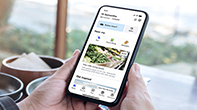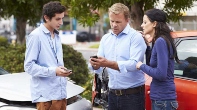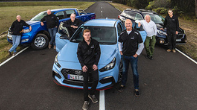With international travel pretty much off the books for the foreseeable, it’s time to look to the highways and byways of the good ol’ Australian soil to get your travel fix. That means the great Australian road trip is back in a big way. A chance to see our ever-changing landscape in a time of massive upheaval, use your tourist dollars to support struggling communities, and get a little elbow room as quarantine winds down. A chance to stay socially distanced without going fully stir-crazy. But how can you stay safe while doing all the above? Check out our tips below.
Where can I go?
How do I fill up my car safely with fuel?
It’s important to keep your hands clean at petrol stations. When you pick up the handle, you’re holding a pump that has passed through countless hands. While petrol stations will no doubt be stepping up cleaning, you can forgo some of the risks by sanitising your hands and putting on gloves before leaving your car. Once you’ve filled up, invert the gloves and throw them away in the bins provided. Before you get back into your car, ensure you wipe and sanitise your hands. Failing to clean your hands afterwards could transfer contaminants straight to your door handles, wallet, phone and other items. NRMA’s Motoring Advice team recommends that once you’ve stopped, you clean your steering wheel, gear lever, seat belt, handbrake and anything else you may have touched.
Should I use a public restroom?
Assume public restrooms are not properly disinfected and treat surfaces as if they have live virus on them. With that being said, it’s often necessary to use. When you do, choose single-stall and well-ventilated bathrooms if you can, and keep your distance from others. Good hand hygiene is key after using a public bathroom, meaning wash and dry your hands; if there’s no soap, use hand sanitiser. It’s also a good idea to pack your own supply of paper towels to use in public restrooms in the event that none are available. Put these in your pocket before entering and use one to shut off the faucet and open the door. Then, immediately discard that paper towel and use hand sanitiser.
Where can I eat?
A road trip won’t quite feel like a road trip if you can’t stop at restaurants along your route. With that being said, being as safe as possible when dining out will require some additional planning. The first thing you’ll need to know is if you’re in a state or a city that allows dine-in customers. The best place to look for this information varies from state to state. The state governments are sharing clear guidelines on their websites. It may also be worth calling the restaurant you have in mind ahead of time to find out exactly what precautions the facility is taking to protect against COVID-19.
While tourism is highly dependent on you eating at restaurants in the places you’re going and helping out the locals, if stopping to get your food fix isn’t on your radar you’re best off taking an esky and breakfast or lunch foods that you can eat on the go. As for picnic supplies, expect most of your meals to be taken to go. A little dishware, some blankets, and a pillow or two can really upgrade a roadside meal. If that’s your speed, you’ll need a little roadside washing station too.
Where can I stay?
Hotels, motels and holiday parks have rethought their approach to sanitisation and social distancing in light of the outbreak and have ramped-up cleaning and safety standards with the use of hospital-grade disinfectants and contactless guest check-in procedures. With this in mind, your best using your own sanitising supplies on ‘high-touch’ surfaces in your room. This includes wiping down exterior and interior doorknobs and handles; the TV remote and bathroom fixtures; and any surfaces on which you’ll rest your belongings, like tabletops or the area around the bathroom sink.
This is how NRMA Parks and Resorts are keeping their guests safe.
How can I stay safe while driving?
1. Wash your hands before and after
Before you leave, make sure you’re as clean as possible. This means sanitising and washing your hands and doing the same each time you make a stop. It’s important to be mindful that there are other people who may be more vulnerable to illness than you. The World Health Organisation has created this great video that demonstrates how to wash your hands effectively. It says regular, safe, effective hand hygiene using soap and water, or alcohol-based sanitiser is a must.
2. Limit the number of passengers you drive around
The risk of exposure also increases the more passengers you have travelling in your vehicle.
3. Keep your car well sanitised
Keeping your car environment clean is a vital part of the hygiene puzzle. Think about what body parts have come into contact with potentially unclean surfaces and rub them down before entering your car. Areas such as the door handle, steering wheel, gear stick, air conditioning and radio buttons can also contain a significant number of germs. Clean these surfaces with surface disinfecting wipes each time you get into the car, or some kind of washable wipe covered in an EPA-recommended cleaning solution.
4. Keep an array of sanitisation products
Every car owner should have a first aid kit in their vehicle, now is the time to add a hand and car sanitisation kit. This should at least contain tissues, alcohol-based hand sanitiser, cleaning products and soap.
5. Cover your nose and mouth
Always cover your mouth and nose with your elbow or a tissue when you cough or sneeze. If using a tissue dispose of it and any other items you may have used. It is crucial to not touch your face if your hands aren’t clean. The virus can enter through your eyes, nose and mouth.












